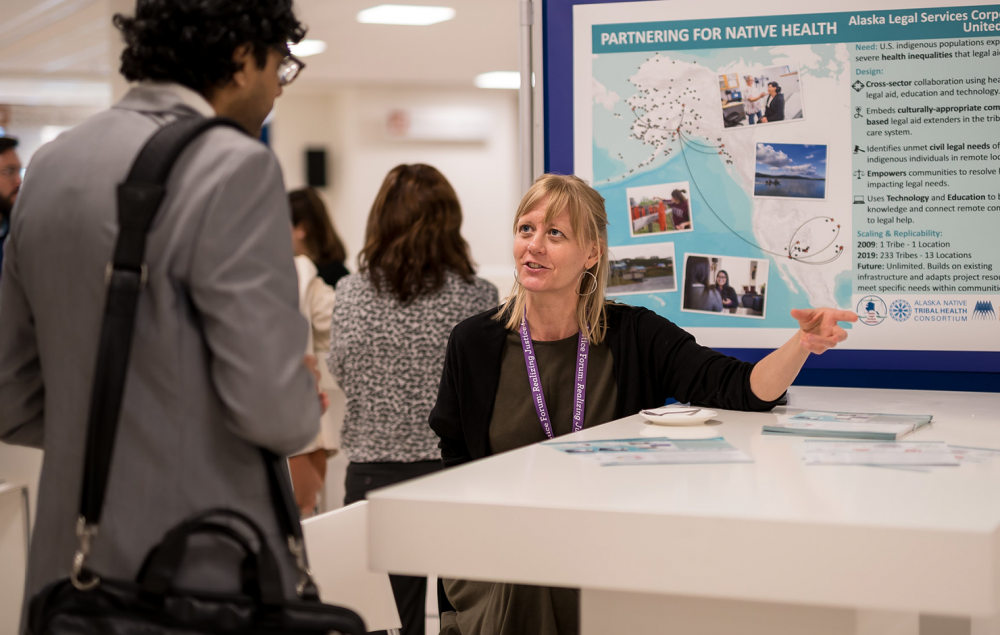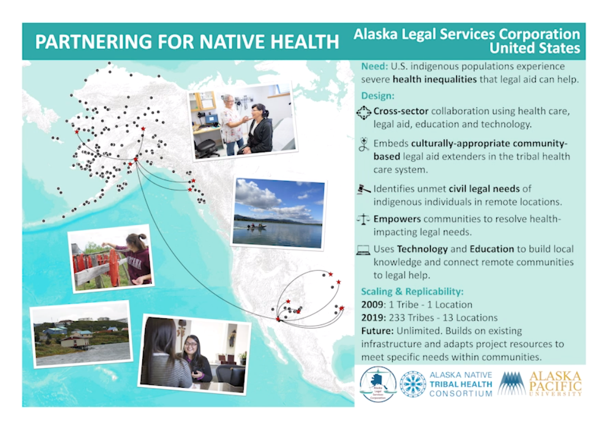

At the World Justice Forum: Realizing Justice for All, the World Justice Project was pleased to award five winners of the 2019 World Justice Challenge: Access to Justice Solutions—a competition to identify and highlight effective and promising work to increase access to justice.
Thirty finalists out of over 250 Challenge submissions were invited to present their projects in The Hague, where Forum participants and a panel of judges voted to select five awardees. The winning projects each received $10,000 USD prizes to further their goals and missions. These projects represent some of the best work being done globally to increase access to justice.

Over the next few weeks WJP is highlighting winning World Justice Challenge projects in turn, providing insight into the access to justice needs being filled, project impacts, and how successes may be replicated in other parts of the world. This week, we discuss Alaska Legal Services Corporation's "Partnering for Native Health" project—the first US collaboration delivering health-impacting civil legal assistance to a target population of economically vulnerable indigenous individuals, specifically targeting remote and rural areas.
Thank you to Nikole Nelson, Executive Director of Alaska Legal Services Corporation, for speaking with us about this work.
Can you describe the project in its most simple terms?
Partnering for Native Health (PNH) is a cross-sector collaboration using health care, legal aid, education and technology to address unmet civil legal needs of indigenous individuals in remote locations in Alaska and the United States. By embedding culturally-appropriate community-based legal aid extenders into the health system, PNH seeks to empower communities to resolve health-impacting legal needs.
Why was this project so necessary?
Indigenous communities throughout Alaska, and the rest of the United States, are often in very remote locations where access to basic services are limited. These communities are off the road-system, where there are enormous barriers to accessing to the justice system. It is estimated that 80% of low-income Americans do not seek help for their legal needs, and those who do seek assistance, 50% of them are turned away by legal aid providers due to lack of resources. PNH is breaking the current service delivery model to penetrate deeper into communities that are currently un- and under-served.
Can you tell us about the positive human impact the project has had?
In the first two years of operation, Alaska Legal Services Corp (ALSC) has experienced a 6:1 return on investment. Reaching an additional 1,447 indigenous people in 107 communities, additionally the program has generated $2.6 million in economic benefits for local communities and $635,542 savings in costs related to emergency shelters and domestic violence.
What has made this project so effective?
Teaming up with our partners, the Alaska Native Health Consortium and Alaska Pacific University has given us the opportunity to learn from our partners and rethink and redesign Alaska’s civil legal aid delivery system. One of the biggest lessons we’ve learned from our partners is that we needed to shift our focus from trying to import something new into the community and instead look at the resources that already existed and build on them. In the United States, the health care system delivery infrastructure is much more robust than the civil legal aid infrastructure. Nearly every community has a health clinic, once we realized that Alaska Pacific University and Alaska Native Tribal Health Consortium were partnering to train a culturally-appropriate community-based health work force, the possibility to incorporate a social justice track within the health workers curriculum emerged. If community-based healthcare workers learned to screen for civil legal needs and address the issues immediately when possible, already existing resources could be used to expand services within communities. If an attorney is needed, the health worker would also have direct access to an attorney in a hub community to quickly address additional needs. Plus, the remote communities will have a local resource to understand their legal needs and a direct avenue to resolution. Ultimately, the Project is effective because of the strong partnerships involved and the learning that has happened as we try to solve community problems together rather than in our various silos.
How can the approach of this project be applied in other parts of the world?
This can be modified to any community based on what already exists on the ground. International communities may lean on already existing services delivery infrastructures such as health care or education to help deliver civil legal aid to marginalized communities. The model adaptable and supports empowering community to know the law and use the law for their benefit.
What is next for this project?
PNH will continue to collect data and assess the effectiveness of the project and look to expand to other marginalized communities.
How has the World Justice Forum and winning the World Justice Challenge helped your work?
It is really wonderful to see the great work that is happening in Alaska through our strong community collaborations and partnerships be recognized as a potential solution to access to justice challenges worldwide. Too often, Alaska Native people are not able to get the help they need to address legal issues that impact their health. We hope this award will help us bring the full scope of our vision for a people-centered justice ecosystem that is fully accessible to all Alaskans no matter their means or how far they live from the court house, to reality.
Is there anything else you want to add?
We are incredibly grateful for this opportunity! Thank you!
Learn more about the World Justice Challenge and all 30 finalists here, and watch the 2019 World Justice Challenge awards and more videos from the World Justice Forum: Realizing Justice for All here.